TOP 12 virtual reception systems
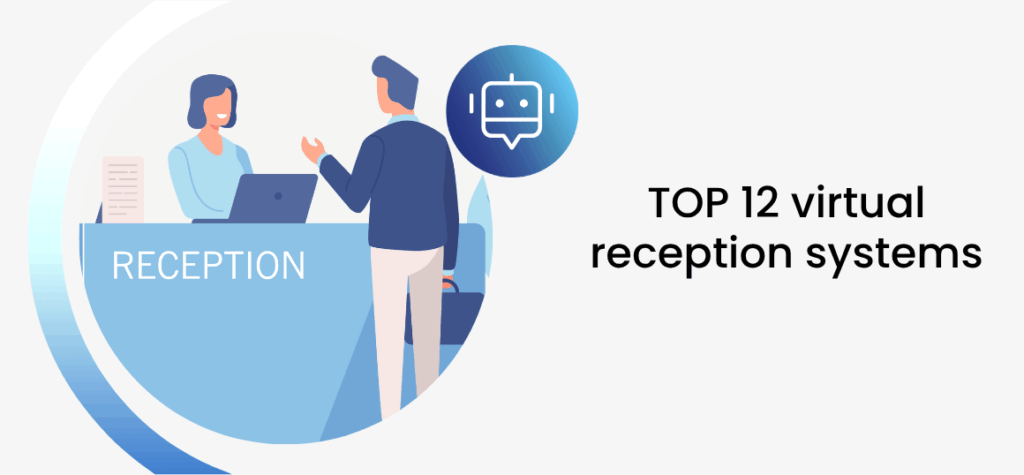
TOP 12 virtual reception systems
Virtual reception systems are tools that significantly simplify the registration process across various types of organizations — including medical facilities, hotels, and other hospitality services. But how do you choose the best provider? Explore our subjective ranking of the top 12 virtual reception systems and find out which one best suits your needs.
What are virtual reception systems?
In short, these are AI-powered tools designed to support customer or patient service. In the case of medical practices, they are most often voicebots that take over the burden of electronic patient registration. Hotels also use voicebots, but with configurations tailored to specific guest service needs, such as handling inquiries and managing bookings. The category of virtual reception systems is broad, but we’ve hand-picked those that, in our opinion, deserve extra attention.
Criteria for selecting the best virtual reception systems
To create this ranking, we used several key criteria. We focused primarily on effectiveness in everyday use, including conversation quality, language comprehension, and speech recognition. We also evaluated technical features and the level of support provided by vendors during implementation and post-sale. We placed strong emphasis on:
- ASR (Automatic Speech Recognition) capabilities,
- NLU (Natural Language Understanding) performance,
- compliance with Polish law, including GDPR regulations,
- accuracy of conversations and intent recognition in Polish,
- integration potential with external systems,
- technical support and service guarantees,
- machine learning capabilities,
- price-to-quality ratio and billing model,
- and more.
Based on these criteria, we selected 12 standout tools and provided a short overview of each. We invite you to explore our top picks and discover the best solution for your organization.
1. EasyCall
EasyCall is one of the market leaders in delivering custom-designed voicebots, which excel as virtual reception systems, particularly in the healthcare sector. Their solutions take over patient handling — including scheduling specialist appointments. EasyCall’s voicebots respond to patient inquiries with high accuracy and provide essential information, offering a convenient experience for both patients and facility staff.
Advantages:
- strong understanding of the Polish language,
- accurate and fast patient routing after registration,
- advanced analytics and reporting capabilities,
- easy integration with external systems and tools,
- high flexibility and scalability of the technology.
Disadvantages:
- limited support for foreign-language patients,
- advanced implementation requires some technical know-how,
- relatively high cost for small medical practices.
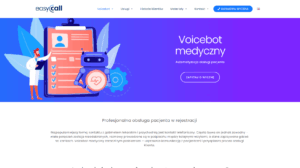
2. Apifonica
In the context of virtual reception services in medical facilities, Apifonica Medical Voicebot is another tool worth noting. It supports up to 150 languages, making it suitable for multilingual environments. Apifonica also offers voicebots for other industries, all with 24/7 support, appealing to even the most demanding clients.
Advantages:
- multilingual support (up to 150 languages),
- natural and smooth phone conversations,
- backed by a global provider of services and tools.
Disadvantages:
- complex implementation process, which may take several weeks,
- high upfront cost, especially for smaller organizations,
- lower accuracy when handling complex or nuanced inquiries.
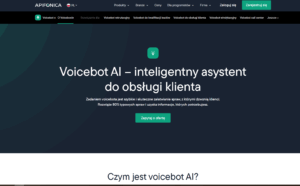
3. Asseco
Asseco is a leading Polish provider of specialized systems and tools, including AI-based virtual reception solutions. For the healthcare sector, the company offers the Asseco Medical Voicebot, designed to handle patient appointment scheduling in clinics and medical centers. Users praise its intuitive interface and high speech recognition accuracy.
Advantages:
- multilingual support for clinics serving international patients,
- advanced conversation flows for various medical scenarios,
- scalable cloud-based solution.
Disadvantages:
- high implementation costs,
- complex and time-consuming configuration,
- reduced performance when handling non-standard inquiries.
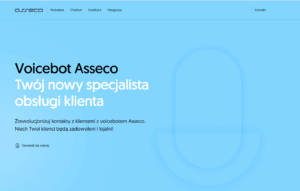
4. Sovva
Sovva S.A. is a Polish company successfully delivering voicebots for handling various types of queries and appointment management, especially in the medical sector. Their solution supports not only appointment booking but also cancellation processing. The tool is user-friendly and easy to navigate, even for those who are less tech-savvy — making it a valuable option for many medical facilities.
Advantages:
- advanced and efficient NLP technology,
- personalized patient interactions tailored to the clinic’s needs,
- simple deployment with flexible feature expansion.
Disadvantages:
- perceived lack of empathy and robotic tone during conversations,
- additional fees for enabling advanced features,
- conversation scripts require fine-tuning, which may extend the implementation time.
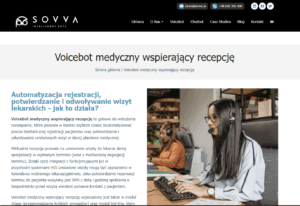
5. Infermedica
Infermedica is a Polish AI-powered platform designed to assist with basic patient service. It supports not only appointment scheduling but also medical triage, helping clinicians by collecting preliminary health information. Additionally, the tool can answer basic patient inquiries and guide them appropriately through the care process.
Advantages:
- high effectiveness in patient support,
- reduces the workload of front-desk staff,
- multilingual capabilities.
Disadvantages:
- technically complex implementation,
- high licensing costs,
- challenges in understanding complex or non-standard patient queries.
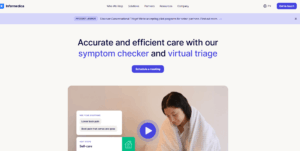
6. Proassist
Proassist is a cloud-based medical system designed for comprehensive patient service, particularly appointment scheduling. It operates in a 24/7 model and includes additional features like chatSMS, medical documentation access, and a reporting/statistics module. Patients can view the 100 nearest available appointments with a single click and select the one that suits them best.
Advantages:
- wide range of services and functionalities,
- technical support during implementation, data migration, and setup,
- 24/7 patient scheduling access.
Disadvantages:
Porozmawiaj z naszym specjalistą
- lacks full AI automation — relies on smaller language models,
- difficulty handling complex queries and unusual cases,
- some features may be complex to learn and require additional onboarding and training.
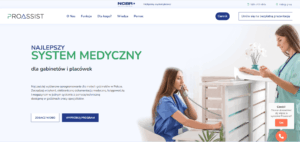
7. Feebi
Feebi AI Chatbot is a text-based AI assistant designed to support the daily operations of hotel receptions, restaurants, and other hospitality venues. It efficiently handles room or table bookings and responds to basic customer questions. Operating in a 24/7 model, Feebi enhances efficiency while reducing staffing costs — especially during night hours or when restaurants are closed, enabling interaction with potential guests around the clock.
Advantages:
- quick and easy setup,
- supports multiple communication channels,
- automates basic front-desk operations.
Disadvantages:
- limited personalization,
- challenges with advanced integrations into third-party systems,
- limited Polish language understanding (performs better in English).
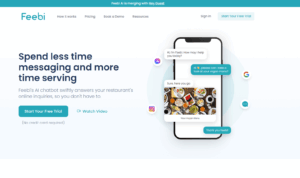
8. Ironteam
Ironteam has developed a voicebot solution dedicated to the healthcare sector, designed to support telephone-based patient registration. It maintains high accuracy while minimizing human involvement in routine processes. It is used for scheduling appointments, handling cancellations, and answering FAQs (frequently asked questions).
Advantages:
- helps reduce patient service costs in medical facilities,
- offers a wide range of features,
- comes with comprehensive technical support from Ironteam experts.
Disadvantages:
- labor-intensive configuration that requires technical expertise,
- limited brand recognition, which may discourage potential clients,
- struggles with handling complex queries or non-standard scenarios.
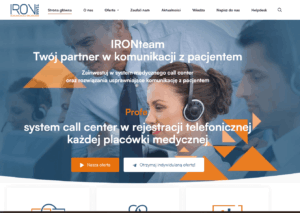
9. Welyo
Among the top recommended virtual reception systems is Welyo, a voicebot designed specifically for medical clinics. It is primarily used to automate patient registration, but it also supports data verification and responds to common patient questions. Welyo helps relieve medical staff from repetitive administrative tasks.
Advantages:
- personalized communication with patients,
- simple integration with physicians’ calendars,
- automatic appointment reminders and a range of additional features.
Disadvantages:
- still in development, which may result in occasional bugs,
- NLP module needs improvement for better understanding,
- requires technical expertise for integration with external tools.
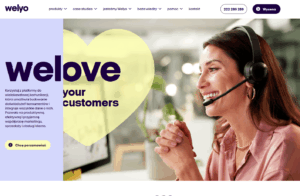
10. HiJiffy
HiJiffy is a voicebot and chatbot solution dedicated to hotels and accommodation providers. It enables room bookings via chat or phone, and answers basic guest questions — such as availability or local attractions. Operating in a 24/7 model, HiJiffy supports multiple languages and integrates with CRM and PMS systems to enhance guest experience.
Advantages:
- extensive features tailored to the hospitality industry,
- multilingual support, ideal for international clientele,
- integrations with PMS and CRM tools for seamless operations.
Disadvantages:
- high implementation and licensing costs,
- requires specialized training for staff,
- limited understanding of Polish, which may impact service quality in local contexts.
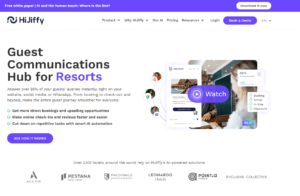
11. Convious
Convious is an AI-powered tool designed for tourism-related venues, such as hotels and amusement parks. It functions well as a virtual reception system, handling customer inquiries and personalizing offers. The platform includes an AI chatbot and focuses on increasing company revenue while improving customer experience.
Advantages:
- dynamic pricing automation for tickets and packages based on demand,
- direct sales of tourism services without intermediary fees,
- handles multiple simultaneous inquiries across various channels.
Disadvantages:
- limited functionality for hotel-specific reception needs,
- adding advanced hotel features requires third-party integrations,
- high implementation and maintenance costs.
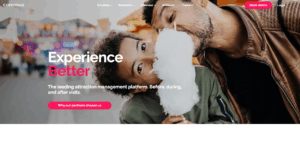
12. Asksuite
Asksuite is a multilingual AI chatbot tailored for the hospitality industry. Its main features include hotel room sales, booking management, and handling FAQs. The system supports omnichannel communication, including social media, making it an effective virtual reception solution.
Advantages:
- omnichannel guest communication across various platforms,
- strong multilingual support, including accurate Polish translations,
- automation of booking processes and guest inquiry responses.
Disadvantages:
- high implementation cost, especially for smaller properties,
- cannot fully handle the check-in/check-out process,
- limited customization of the interface for front-desk staff needs.
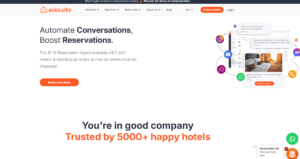
Which virtual reception system should you choose?
There’s no one-size-fits-all answer to the question of which virtual reception system is best. In this ranking, we’ve described 12 selected tools, each tailored to different industries and purposes. The right choice depends on the specific needs of your organization and the industry in which you operate. If you’re unsure, it’s worth consulting an expert. While voicebots and chatbots greatly support the work of reception desks in hotels and medical facilities, they are not yet a full replacement for human staff — oversight is still necessary. Looking for a high-quality, effective AI solution? Let our ranking be your guide.
